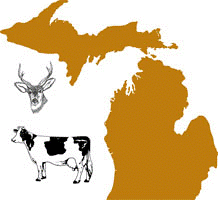Wildlife Disease and Zoonotics

Michigan Bovine Tuberculosis Bibliography and Database
Date of this Version
2007
Citation
Proceedings of the 12th Wildlife Damage Management Conference (D.L. Nolte, W.M. Arjo, D.H. Stalman, Eds). 2007
Abstract
Bovine tuberculosis (bTB) is a zoonotic disease caused by Mycobaterium bovis, and is transmissible to humans, wildlife and domestic livestock. In the northern Lower Peninsula of Michigan, white-tailed deer ( Odocoileus virginianus) serve as a reservoir for the disease and pose a significant threat to domestic cattle and captive cervids. Scientists at USDA, APHIS, Wildlife Services, National Wildlife Research Center have designed a variety of laboratory and field studies aimed at reducing or eliminating bTB infection in cattle by interrupting the transmission of the disease from wildlife reservoirs. These strategies include reducing bTB in deer by delivery of oral vaccines, creating effective barriers to cattle/wildlife interactions, determining the role of other wildlife species in the transmission of M. bovis, and evaluating a sentinel species to monitor prevalence of bTB in the environment. In addition, studies are being conducted to assess transmission risks between deer and cattle on cattle farms and to recommend mitigation measures to reduce these risks. These studies will provide comprehensive information on the role of wildlife-livestock interactions in the maintenance and spread of bTB as well as recommendations of measures to contribute toward its eventual eradication in domestic cattle in cases where wildlife is the source of infection.

